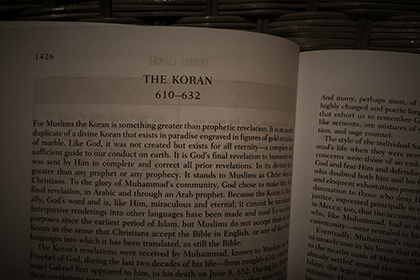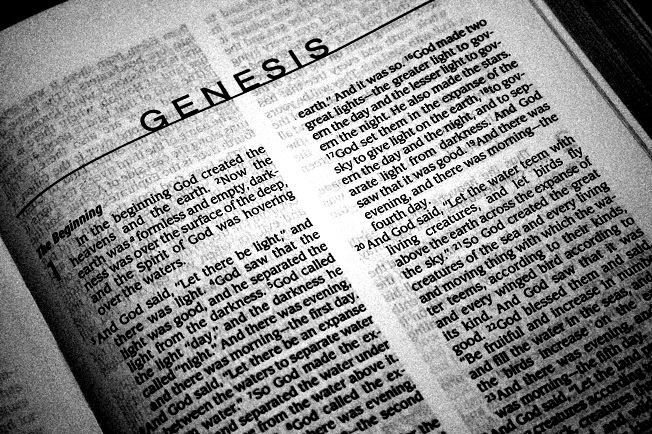My journey was long and winding. I’m not an outwardly religious person, and I normally don’t volunteer my religious views. Muslims aren’t popular in the United States, and revealing that you’re Muslim can sometimes be a dangerous proposition.
I feel compelled here, however, to speak candidly about my journey. It’s a la mode these days to bash Islam, stereotype and pidgeonhole and caricature Islam. I hope my story can cast a different shade on the conversation and reveal that Islam is a complex thing, and with over one billion adherents, is far from monolithic.
I wasn’t raised Muslim. As a matter of fact, I’m the most religiously Muslim person in my family—my parents are basically cultural Muslims. I was five years old and I asked my dad “Baba, what are we?” “Oh, we’re Muslim.” And that was the extent of my religious instruction from my family. We ate pork; my mom enjoyed wine and beer; I openly and notoriously dated.
Islam was my choice. I know what Islam is and what it represents might be different to someone who has it imposed on them. Even filet mignon isn’t enjoyable when it’s shoved down your throat.
I was 19 and in a bad place. Life changes, academic pressure, friction with my family, and ending my first relationship had me emotionally disoriented. I noticed that my college had an Islamic studies class, and as a general history buff with law school aspirations, it seemed natural.
The Islam I learned about was leagues away from the Islam portrayed on television. The only thing radical about Islam was how inclusive it was. It accepted all adherents of the abrahamic religions. Moses and Christ are both considered Prophets equally important to Mohammed—if Abrahamic monotheism was the Star Wars trilogy, Islam viewed itself as Return of the Jedi.
Women had extensive property rights. Considering that the Quran was written in the seventh century, this makes it a radical feminist text. Comparatively, the Vatican didn’t recognize that women even had souls until the fifth century. Women in the United States were the property of men (father or husband) until the 1870s. But to Muslims, God did not believe in race or nationalism. All were equal before God.
Islam wasn’t afraid of science—it embraced it. Islam prized education and literacy: God’s first miracle performed before the prophet Mohammed was to make him be able to read.
God was forgiving and merciful. I was introduced to the idea of a being capable of knowing me so intimately, understanding my thoughts and motivations and intentions, and understanding my shortcomings.
The most important part to me was that there was no compulsion in faith. You’re allowed to practice what you want, and set aside what rituals you don’t care for. The idea is that those rules are for human benefit: God doesn’t need them, we do. You aren’t a bad Muslim if you enjoy a beer or some wine, or even if you can’t resist some pepperoni pizza.
The thing that appealed to me was the contempt for hypocrisy. Hypocrisy was my major beef with the loud practitioners of religion whom I encountered. The gay-hating closeted gay pastor; the politician who goes to church on Sunday, meets his mistress Monday and divorces his cancer-striken wife on Wednesday; the moral majoritarian who frequents prostitutes; the list goes on. In Islam, the worst thing you can be is a hypocrite.
It wasn’t all magical. Like all religions, the adherents can be a problem. I traveled to Iran to visit family. While I was there, I’d hoped to get closer to Islam—after all, it is an “Islamic” republic. I was wrong. In short, I saw an almost part-for-part analogue of what was wrong with conservative reactionary Christian theology in the United States played out in Iran. I saw hypocrisy. I saw priests driving around in Mercedes when there were people starving in the street. This wasn’t the Islam I learned about. This wasn’t my Islam.
What I learned from that disappointment was that each person has to travel their own spiritual journey. You can’t get a 1040EZ form for faith. It isn’t something for the lazy. It’s a long, rocky hike where you might stumble and fall and scrape yourself up. You have to be willing to struggle. Some folks don’t have the patience for it, and perhaps faith just isn’t for them. Not everyone likes pizza either. It takes a particular type of person. I got comfortable with an idea of what my Islam was. My Islam was inclusive. My Islam embraces all—and yes, that means LGBTs. It wants to end poverty and hunger, illiteracy and ignorance. It seeks peace in the human family. It’s still a struggle from time to time. I get so absorbed into the busyness of my life—law school, starting a nonprofit, getting scholarships and hustling money for fun—that I don’t set aside time to reflect on my life from the macro view.
I see my Islam in my American generation. I see it in Mos Def and Brother Ali and Lupe Fiasco, in Dave Chappelle and Aasif Manvi and Rainn Wilson—an enlightened but idiosyncratic expression of the human condition: beautiful and chaotic and flawed, but always trying to be better and never losing hope. I don’t eat pork, but I do drink. I date women. I am by no means a strictly adherent Muslim in any “conventional” sense. But I think convention is bullshit—it’s a euphemistic term for uncreative or lazy.
I’m Muslim. I’m proud to be Muslim. But if I get to have kids, I will want them to choose their own path. It’s only fair: that’s what I did. I’m comfortable with the possibility that there is no god, no afterlife, none of the mysticism of religion; there are finer points I disagree with, even within the text of the Quran. I don’t view faith as an all-or-nothing ultimatum. . The totality of the philosophy speaks for itself. As a Christian friend of mine once said, “Truth is truth.” The truth to me is that the point of us being here is to love each other, comfort each other, and keep the other from suffering. It’s okay that I falter or fail or have my moments of doubt and cynicism, and even disagreement with what may be considered ‘devout.’ Ultimately, the word “faith” means not knowing.

Photo by Sara Slattery
